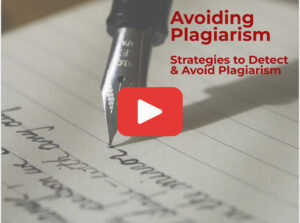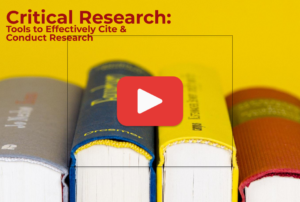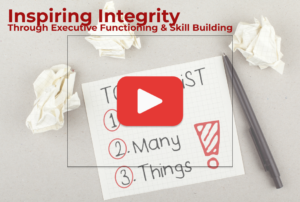Integrity Matters:
Celebrating Academic Integrity Week
Academic Integrity is vital to upholding the standards of excellence and rigor consistent with our Unifying Values. Academic Integrity Week is a time to reinforce our commitment to honesty, ethics, and responsibility in academia. Throughout the week, there will be a focus on topics for students and instructors, including:
- Deterring and detecting plagiarism and inappropriate collaboration
- Artificial Intelligence and chatbots like ChatGPT – implications for academic integrity and pedagogy reform
- Research anxiety and student well-being
- Reporting procedures and disciplinary actions for integrity violations
- Fostering a culture of integrity, excellence, and accountability through assignments and classroom policies
Spring 2024 Academic Integrity Week Sessions
Students are wondering about the use of AI in the classroom, experimenting with new technologies to gather content and worried about what might be academically allowable. Faculty can encourage academic integrity best practices by including the use of AI and other technologies for a myriad of purposes (grammar review, editing and content development) within course assignment prompts. A demonstration of the use of “training wheels” which can be provided to the students to augment assignment prompts and reference reporting (surveys and forms) will be shared to extend student learning tools while reinforcing academic integrity rules.
Artificial Intelligence (AI) holds immense potential to support students in their research. However, with this power comes a responsibility to ensure that AI is implemented and utilized ethically. This workshop aims to provide participants with a comprehensive introduction to the ethical considerations surrounding the use of AI in research. By the end of the workshop, participants will be able to critically assess the ethical implications of AI in research to ensure responsible and ethical AI development and deployment. Key topics of the presentation include: Ensuring transparency and acknowledgment in AI-driven research projects. Navigating ethical considerations in data collection, usage, and privacy Recognizing biases in AI algorithms. OpenAI. (2024). ChatGPT (Feb 16 version) [Large language model]. https://chat.openai.com/
To mitigate issues of equity and academic integrity with the traditional WRIT 340 portfolio assignment, I propose a summative final assessment in the form of an in-person exam in which students re-write a short portion of their own previously submitted work. Distinct from a traditional timed essay exam, this assessment consists of a timed revision of a student’s own work, with the type, style, and goal of the revision determined by a course-specific prompt. This format captures a significant portion of the benefits of the traditional portfolio in terms of assessing revision skills and critical thinking regarding one’s writing, while also clarifying the degree of student understanding of curricular principles and decreasing the likelihood of cheating.
During this panel discussion, learn effective strategies to initiate conversations with students, fostering an open and non-confrontational dialogue when you have academic integrity concerns. Our expert panel will guide you on recommended practices for reaching out to students, offering support, and addressing emotional reactions that may arise during the conversation. Equip yourself with the tools to handle academic integrity concerns during this hour.
Join the Kortschak Center for Learning and Creativity staff for an active introduction to specific strategies that will support your growth, overall academic success, and health & wellness, all while setting you up for success in the classroom and your co-curricular communities. Specific strategies include: time management, stress-management and self-care.
Learn approaches to integrating sources to reduce academic integrity issues.
This workshop will explore:
- Conditions under which ChatGPT is more likely to hallucinate citations and abstracts to research papers
- Easy ways to change your writing assignments to reduce the appeal of using ChatGPT
- Ways to identify potential ChatGPT-created citations
- How to use USC Libraries resources to determine if a cited article is real or hallucinatory.
Previous Academic Integrity Week Sessions
USC Librarians Jennifer Silverman and Michaela Ullman share tips and techniques to successfully identify and avoid submitting plagiarized academic work.
Ariana Varela, Information Literacy Instruction Librarian at USC Libraries, will discuss incorporating critical information literacy skills and citation justice into your research. Participants will practice citation chaining and learn about resources available to help track your research and citations.
Learn skills and techniques to effectively work with students and encourage organization and productivity. Presented by the USC Kortschak Center.







